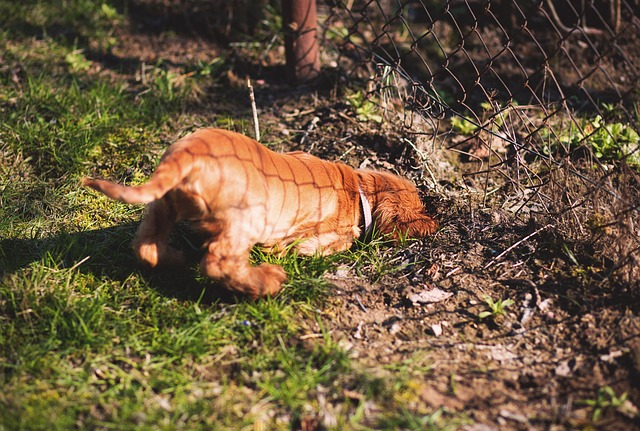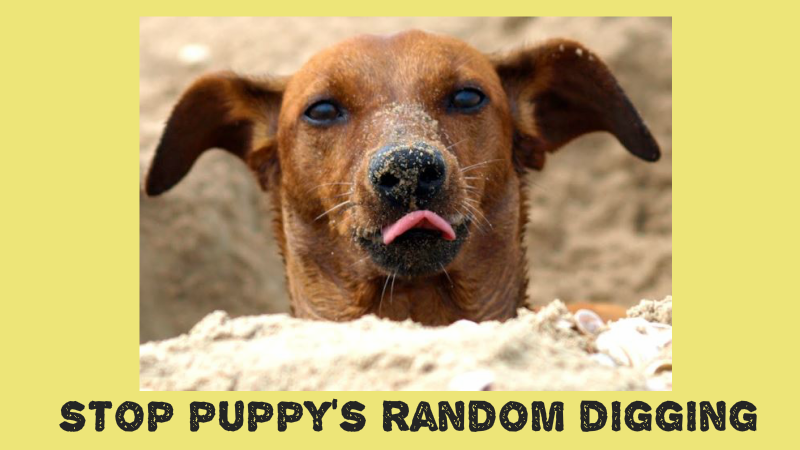Stop Puppy Digging
How to Stop Puppy’s Random Digging
Why Do Dogs Dig?
The instinct to dig is strong in a lot of canine breeds and most commonly begins in puppyhood. Is your puppy digging to the extent that your garden begins to look like a minefield? Dogs have it hard wired in their brains to dig. This comes from generations of survival in the wild before dogs became domesticated and assigned mans best friend status. These survival instincts possibly stemmed from the need to hunt and consume their prey. This would most often have occurred while part of a pack (Heard the expression “pack of wild dogs ?). This pack hunting would have allowed these dogs to hunt larger prey. Once the prey had been caught, the feasting would have started according to the hierarchy within the pack. From time to time, they would not have finished what they had managed to extract from the fallen prey. Rather than just leaving the remains and moving on their way, they buried them, possibly to come back and finish at a later time. This burial also would have masked the scent of any remaining uneaten food.
Any excessive and random digging may also be an energy outlet if your puppy is feeling a little separation anxiety from his owners.
Your Puppy Has Digging in His DNA
Your puppy will from time to time have that same urge to dig – to find some bone he may have buried, to check out an interesting scent he has discovered or maybe even just out of boredom. This discharges excessive energy and for puppies is just plain fun. But why dig so many holes you may ask? Well, your puppy may not quite remember where he has buried something in the past, so if he does not find what he is looking for, he will simply dig another hole, either until he finds what he is looking for, or gets bored.
How to Stop Your Dog From continmued Random Digging
Problem or random digging will most probably be in your own back yard. If you catch him excavating in a place that is not allowed, counter him by saying “NO DIG!”, while leading him to the place where digging is permitted. If he digs in this assigned excavating location, give him generous praise to re-enforce this training.

The very best means to regulate your puppy’s urge to dig is to give him an area in the backyard where he is allowed to dig to his heart’s content. If you do not truly mind that he digs in a designated spot, this might be an area where you’ve currently seen him digging. Or, you may wish to tempt him to dig in a location that that is out of the line of sight from where you have your favorite view of the yard, just so you won’t have to constantly look at what can become a bit of an unsightly mess.
Provide a Pool For Your Puppy’s Digs
One way of having a place for your puppy top dig AND conserving your lawn is to buy a small cheap inflatable swimming pool and place this in your back yard in the area assigned for your puppy’s digging. Fill this with sand and dirt. You can pre-install some tasty and smelly treats in this filled in pool enclosure to get your puppy to fall in love with his new dig spot.
Finding Dig Spots Is Not Always Easy
If you live in an apartment, it is probably unlikely there will be any permission to dig in the grounds about the apartment. You will need to be vigilant here when you are in these areas with your dog. A young puppy should be on the leash at all times, both for protection from other more aggressive dogs and to keep him from wandering onto the road. This can cause a significant risk for himself and for any motorists and pedestrians in the area. Many drivers would make sudden evasive moves to avoid hitting a loose puppy in the road. This, in turn, increases the risk to other drivers, pedestrians and property.
Allowed Digging – The Beach
If you have the opportunity to take your puppy to the beach, do your best to visit the beach on a regular basis. Be aware that not all beaches allow dogs, and also that some beaches allow dogs to be exercised off the leash. Take appropriate precautions to ensure that your puppy is not put at risk with other dogs loose on the beach that may show signs of aggression.
A beach is an ideal place for your dog to dig to his heart’s content. There will be an absolute treasure trove of scents and textures for him to explore, as well as allowing him to burn off some of that excess energy. Just be sure that if your dog does dig deep holes on the beach that you fill them in upon departure. No-one wants to risk injury while walking on the beach and stepping into a large hole. If the digging is confined to within the zone where the tide comes in, they are a little more obvious for walkers on the beach and the bonus is that nature will fill these holes in for you by the next high tide.
Allowed Digging – Your backyard
To get this process started in a fun way, you can bury some of his favorite toys or even a bone in a section of the yard that has been designated as the “dig zone”. Start digging with your puppy and he will almost certainly join in. It can be a lot of fun to play this “Dig for Lost Treasure Game” with your puppy.
Every day, take your puppy to the designated area in your yard and give him the dig instruction. It could be as simple as “Sparky, Go Dig!” It won’t be long before he will get the hang of the routine. You may even see him pawing at the dirt in anticipation of the fun he knows he is going to have.
Despite the fact that he has his own digging place, you might find that your young puppy may occasionally dig in areas he shouldn’t. Shield these locations with a temporary fence (like poultry cable or chicken mesh). It won’t be long before your puppy becomes consistently aware that digging should only happen in the assigned place. Eventually, you will be able to take down the fencing and offer him the run of the whole backyard. – and be assured that he can control that “dig” instinct to the assigned area. In time, this behavior will reduce.
It won’t be long before both of these puppy traits have been successfully managed. As with all puppy training, the key is to have a consistent and patient approach and to use the reward for good behavior rather than any scolding or negative behavior from you.

